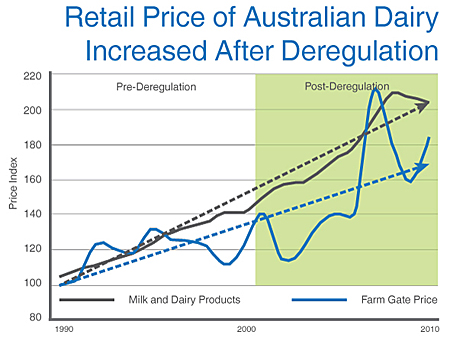Dairy Farmers of Canada deserves some kudos from their farmers. I hope the industry is sharing this material far and wide to their producers. Producers are increasingly finding their information and updates via Twitter and sharing it!! They in turn, can transform and impact what kind of information the media is getting by posting from Twitter.
I am amazed at how widespread items can be. It just takes a tweet to the right place or forum. Go for guys!-CG
One Size Does Not Fit All in Food Trade
Posted: 08/01/2013 5:22 pm
Another Conference Board of Canada report claims supply management drives up prices and discourages international trade. I found it interesting to see some trade truths being acknowledged, that one-size does not fit all. Here are some more facts:
Farmers are not against trade. Canadians want Canadian food, and coffee of course!
There is no evidence that deregulating Canada's dairy market would result in lower prices for consumers. In fact, international experience tells us otherwise.
The Australian milk industry deregulated in 2000. The experiment did not work out as people had hoped: Dairy Australia monitored farm price fluctuations increased, hurting farmers, and consumer prices just kept going up at the same pace as before, according to the Australian Bureau of Statistics, resulting in this situation:

Neither consumers nor farmers are benefiting. In the post-deregulated Australian dairy market, price fluctuations faced by farmers are more severe, and consumers are continuing to face rising prices.
It does not seem to work in Columbia either, which I do not find surprising. I've blogged about this before.
Furthermore, supply management has not prevented Canada from negotiating significant international trade agreements. Since 1986, with supply management firmly in place, Canada has completed free trade deals with the U.S. and Mexico (NAFTA), Jordan, Columbia, Peru, Costa Rica, Chile, Israel and EFTA (Switzerland, Norway, Iceland and Liechtenstein).
Furthermore, supply management has not prevented Canada from negotiating significant international trade agreements. Since 1986, with supply management firmly in place, Canada has completed free trade deals with the U.S. and Mexico (NAFTA), Jordan, Columbia, Peru, Costa Rica, Chile, Israel and EFTA (Switzerland, Norway, Iceland and Liechtenstein).
It must be noted that in these negotiations, Canada was not alone in wanting to "protect" certain sectors. Beef, sugar, dairy and rice are often considered "sensitive" by several countries in trade talks, as are cars, procurement and other services. See the complete article at: One size does not fit all in Food Trade